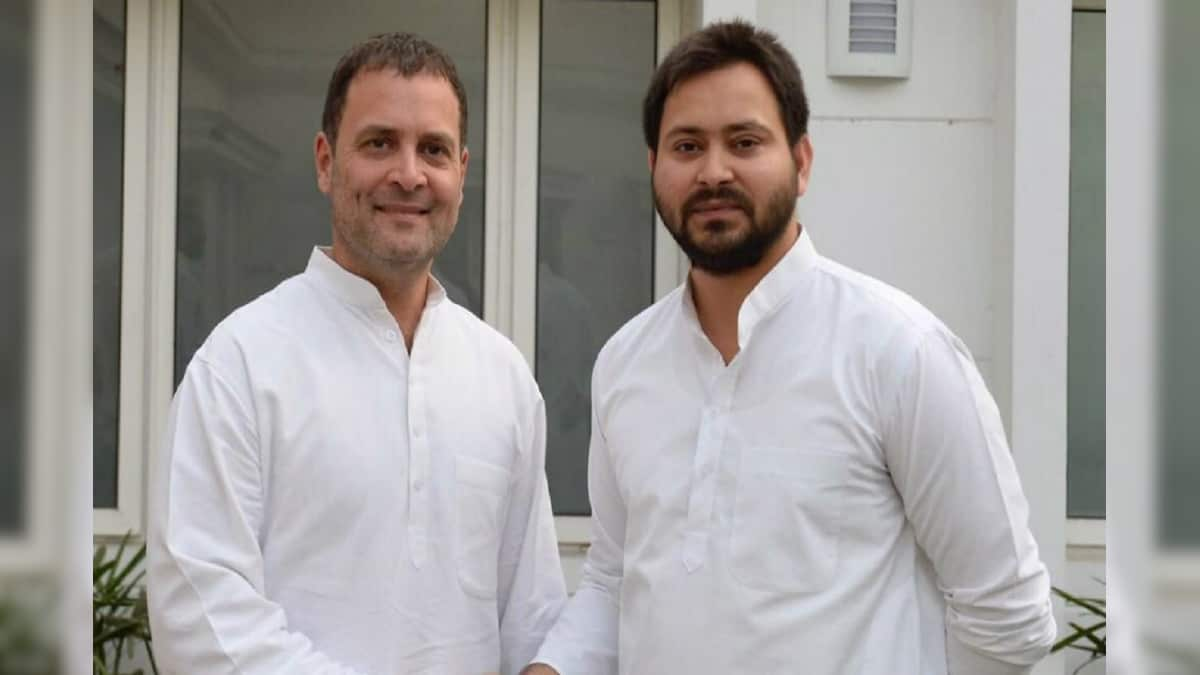Image Source: News18
In Bihar, the INDI alliance has announced a significant political development, comprising major parties such as the RJD, Congress, and Left parties, has recently finalized its seat-sharing arrangement for the upcoming Lok Sabha elections. This strategic move, announced on Friday (March 29), delineates a structured approach for the distribution of electoral seats within the alliance.
Under this agreement, the RJD, helmed by its experienced leader Lalu Prasad Yadav, emerges as a prominent contender, slated to contest 26 out of Bihar’s 40 Lok Sabha seats. The Congress, a stalwart in Indian politics, is set to field candidates in nine constituencies, while the Left parties have been allocated five seats, showcasing a collaborative effort aimed at maximizing electoral gains.
The Congress, known for its pan-Indian presence and historical significance, has strategically chosen its battlegrounds in Bihar. It will deploy its candidates in Katihar, Kishanganj, Patna Sahib, Sasaram, Bhagalpur, West Champaran, Muzaffarpur, Samastipur, and Maharajganj constituencies. This selection reflects a calculated approach, considering factors such as regional dynamics, demographics, and the political landscape of each constituency.
Simultaneously, the Left parties, comprising ideological allies such as the Communist Party of India (CPI) and the Communist Party of India (Marxist) [CPI(M)], have staked their claim in the electoral arena. The Left’s decision to contest from Begusarai, Khagaria, Aarh, Karakat, and Nalanda underscores their commitment to represent diverse segments of Bihar’s electorate, especially those aligned with socialist and communist ideologies.
This development assumes significance against the backdrop of Bihar’s complex political ecosystem, characterized by a mix of caste-based politics, regional aspirations, and ideological affiliations. By consolidating their strengths through a cohesive seat-sharing arrangement, the INDI alliance aims to pose a formidable challenge to its political adversaries in the upcoming elections.
Notably, this announcement comes in the wake of the NDA’s earlier seat-sharing pact, which saw the BJP and the JD(U) finalizing their respective electoral strategies. Within the NDA fold, the BJP, a dominant force in national politics, is slated to contest from 17 seats, leveraging its organizational prowess and popular appeal. On the other hand, the JD(U), under the leadership of Chief Minister Nitish Kumar, will vie for victory in 16 constituencies, banking on its regional stronghold and developmental agenda. And 5 seats were given to the popular youth leader Chirag Paswan’s LJP faction. While Upendra Kushwaha’s Rashtriya Lok Samta Party (RLSP) and Jitan Ram Majhi’s Hindustan Awam Morcha (Secular) will fight one seat each.
The juxtaposition of these alliances highlights the intensifying electoral dynamics in Bihar, where every seat holds the potential to sway the balance of power. As political parties gear up for an arduous electoral battle, their strategic maneuvers and tactical alliances will shape the contours of Bihar’s political landscape in the foreseeable future.
In essence, the finalized seat-sharing arrangement within both the alliances underscores a calculated effort to optimize electoral prospects, mobilize support across diverse demographics, and chart a course towards electoral success in Bihar’s high-stakes political arena. As the countdown to the Lok Sabha elections commences, all eyes are on Bihar, where the battle for supremacy promises to be fiercely contested and closely watched.
Table of Contents
After Bihar, INDI Alliance in Maharashtra faces roadblock in seat sharing

Image Source: Deccan Chronicle
The Maha Vikas Aghadi, comprising opposition parties in Maharashtra, faces a significant obstacle that jeopardizes its united stance against the BJP in the upcoming Lok Sabha elections. Shiv Sena, led by Uddhav Thackeray, has stirred controversy by unilaterally releasing its first list of 17 candidates, despite ongoing discussions among the three MVA partners Congress, NCP, and Shiv Sena – to finalize seat-sharing arrangements. This move has prompted a sharp rebuke from Congress leader Balasaheb Thorat, emphasizing the importance of adhering to coalition principles. Thorat insisted that Congress remains steadfast in its claim to contest three specific seats, which are coincidentally included in Shiv Sena’s list. He criticized the unilateral decision-making process and stressed the need for collective decision-making within the alliance.
Furthermore, the MVA encountered another setback when Vanchit Bahujan Aghadi (VBA) leader Prakash Ambedkar announced his party’s decision to go solo in the elections, unveiling candidates for eight Lok Sabha seats. Ambedkar, grandson of Dr. B R Ambedkar, accused MVA allies of attempting to exploit his party for promoting dynastic politics, a charge vehemently denied by the MVA. Despite this, Ambedkar offered a glimmer of hope to Congress by stating that VBA would extend support to select Congress candidates. This move adds complexity to Maharashtra’s political landscape, underscoring the challenges of coalition politics and the delicate balance of power within the MVA alliance.



